Veterans Day 2023: Meet the heroes who kept America safe
by Heather Robinson

From The New York Post
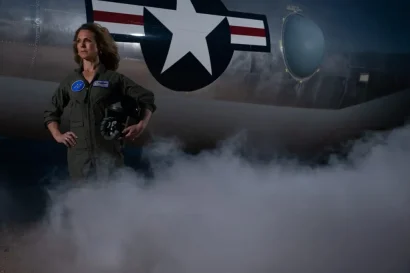
“We all have courage, that spirit of sacrifice, inside of us,” says Combat Pilot Heather Penney, “regardless of whether you’ve raised your right hand and sworn to protect the country.” Heather “Luckyâ Penney
On Veterans Day Weekend 2023, we can be proud that the United States still has citizens willing to fight and die for their country.
As America faces renewed threats both at home and abroad, meet eight brave US veterans of our nation’s two most recent conflicts, Operation Iraqi Freedom and Operation Enduring Freedom in Afghanistan.
In their post-military lives, these heroes continue to embody a spirit of service, and encourage all of us to follow suit.
Many were severely disabled as a result of their service, and all lost friends.
Some are skeptical of the policy decisions that led America into long military entanglements.
Yet none regrets their time in uniform.
With gratitude, The Post presents snapshots of their stories and their thoughts on the challenges now facing the nation.
Daniel Patrick O’Shea
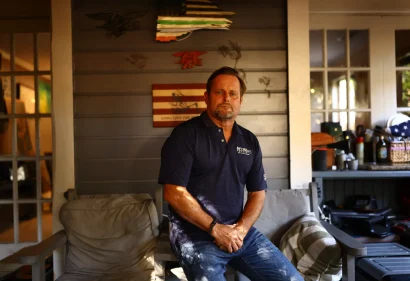
Daniel Patrick O’Shea at home in Tampa. During his time in Iraq, O’Shea helped prevent hostage-taking and negotiate hostage release. Edward Linsmier for NY Post
Ret. Navy Seal, coordinator of the US Embassy’s Hostage Working Group; 56; Lecturer at Joint Special Operations University, Tampa, Fla.
Tour of Duty in Operation Iraqi Freedom: July 2004—April 2006
When Dan O’Shea arrived in Baghdad to help address the hostage-taking crisis in Iraq, some 30-40 Americans and foreign nationals were being taken captive each month.
The final month of his deployment only one hostage was abducted.
“Despite not pulling off a lot of rescues, we provided intel that enabled many people to take measures to avoid being kidnapped,” O’Shea recalls proudly.
Nearly two decades on, O’Shea believes Islamist extremism is America’s top security threat and the U.S. must support allies like Israel in ways that are highly strategic.
“There is no difference in the mindset of Al Qaeda, Islamic Jihad, ISIS, Hezbollah, or Hamas. They all seek a global Islamic Caliphate through violence,” he says. “Hamas uses their own people as human shields. They are not a resistance but a terrorist group.”
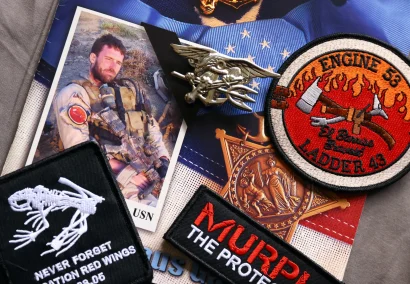
Mementos from O’Shea’s time in uniform. Edward Linsmier for NY Post
O’Shea returned to active duty in the Navy after September 11th, and in total spent more than two decades overseeing hostage rescue efforts.
“I can look back and say some were never captured, and others came home to their families, because of the work we did. My two years in the Lion’s Den were worth it.”
Staff Sgt. Johnny Joey Jones
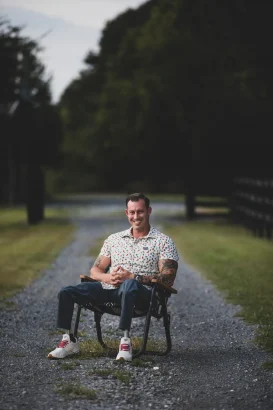
Johnny Joey Jones helped dismantle explosives, and was injured during an explosion during his time in Afghanistan. Joseph Edwards
Explosive Ordnance Disposal Technician, USMC, 37; Fox News contributor and Fox Nation Host, author of Unbroken Bonds of Battle: A Book of Heroism, Patriotism, and Friendship.
Newman, Georgia
Tour of duty in Afghanistan: March 15-August 6 2010
Johnny “Joey” Jones volunteered for Explosive Ordnance Disposal (EOD) school, an elite Marine Corps unit, wanting to be a “better version” of himself.
On Aug. 6, 2010, an Improvised Explosive Device (IED) tore his legs off at the knees while in Afghanistan.
Before he was injured, he disabled 78 IEDs, putting his life on the line “so fewer lives and limbs were lost to our service members, and the people of Afghanistan.”
Recovery led to Jones’ career as a military analyst, media personality, and author — most notably on Fox News.
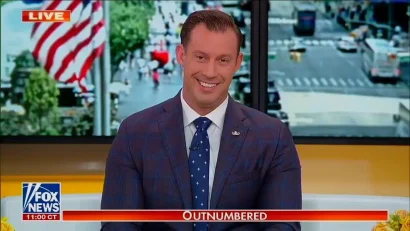
Today, Jones regularly appears on Fox News talking about diplomacy issues. FOX
While Jones believes in US support for allies like Israel, he is against boots on the ground either there or in Ukraine.
Some US politicians “said there were WMD in Iraq and we could go into Afghanistan and quickly defeat the Taliban. We should have asked, ‘What is the end game? How does it make us safer?’
“Afghanistan didn’t have to be such a resource dwindling long war—by resources I mean lives and limbs.”
But he has no regrets.
“When I look at my kids I feel it was worth it, because the next enemy who might attack us knows there are…Americans who would fight and die for this country.”
Ret. US Air Force Major Heather “Lucky” Penney

Penney, a decorated fighter pilot, almost paid the ultimate price for her service. Heather Penney
Combat fighter pilot, 49, defense policy analyst at Mitchell Institute for Aerospace Studies, Alexandria, Virginia
Tours of Duty in Operation Iraqi Freedom
February—June 2003/August –November 2006
On the morning of September 11, 2001, Heather Penney was in a meeting with fellow national guard pilots in Washington DC when a plane hit the World Trade Center.
Minutes later, another commercial jet slammed into the second tower. Then they saw the smoldering devastation at the Pentagon on TV.
Since the District of Columbia has no governor, the National Guard scrambled to find someone to authorize shooting down a fourth plane then veering wildly off course toward Washington.
Vice President Dick Cheney gave the green light, but the Guard had no time to load F-16s with missiles to take the airliner down.
Penney’s boss, Lieutenant Colonel Marc Sasseville, made a bone-chilling decision: the only option was for the two of them to crash a pair of Air National Guard F-16s into Flight 93—which would have essentially been a double suicide mission.
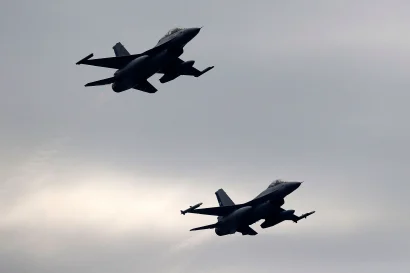
An F-16 fighter jet, like the type Penney was almost forced to crash into Flight 93 on September 11th. AFP via Getty Images
“He chose me because I was single; everyone else had a wife and kids. I couldn’t call my folks to say goodbye; there wasn’t time.”
But Penney was not afraid.
“My only concern was that I do my job well. You realize if that is what history is calling on you to do, that is your purpose.”
The pair took off into what was the last blue sky Penney expected to see – but they never found Flight 93: the plane’s passengers had overwhelmed the terrorists and forced a crash landing in Shanksville, Pa.
“The passengers on Flight 93 were the true heroes,” said Penney.
Penney served two tours in Iraq as a fighter pilot intercepting Iraqi missiles from hitting Saudi Arabia and Israel and supporting counterinsurgency operations.
Today, Penney believes the US needs a large military to “deter Russia and China” and “not turn a blind eye to Islamist terrorism.”
“The global community has sought to … allow Hamas to take a governance role, but I think what Hamas has done is a clear indicator that we must take a stand against them.”
Sergeant Major Randy Neeley
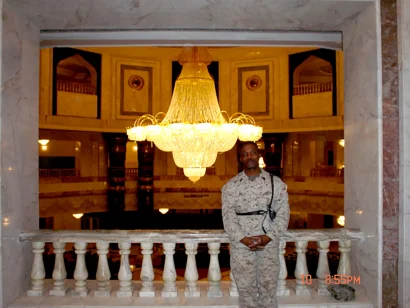
Neeley during his service in Iraq. Sergeant Major Randy Neely
USMC, base sergeant major at Al Taqaddam Air Base, west of Baghdad; 24-year reservist; 60; UPS driver, Helena, Alabama
Tour of duty in Operation Iraqi Freedom: January-April 2005
When Sergeant Major Randy Neeley thinks of his time in Iraq, he remembers the Marines who worked mortuary duty.
While he was busy handling disciplinary and interpersonal issues for the more than 2,000 at bases such as Camps Fallajuh and Blue Diamond, the mortuary men bagged personal items, and cleaned the bodies of the fallen in preparation for transport from from Iraq.
“I’d think, ‘Wow, tough duty!’”
Still, Neeley doesn’t recall hearing a complaint from these soldiers.
“No one ever said, ‘Sergeant I can’t do this — I’ve gotta get outta here.’
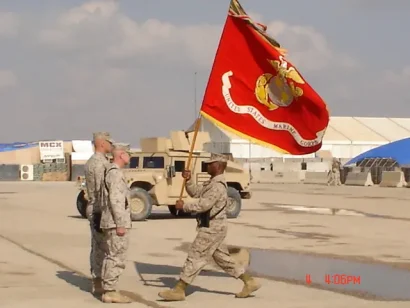
Neeley says he was particularly taken by marines who helped look after base mortuaries. Sergeant Major Randy Neely
“It was, ‘This is my job.’
“They were my heroes.”
Nearly two decades on, Neeley still believes in the ability of ordinary folks to become heroes.
He salutes Israel’s requirement for two-to three years of military service for all citizens, and he encourages young Americans to pursue military careers.
“It teaches sacrifice. It made me a better husband, father, and human being all around.”
US Army Sergeant Jose “Joe” Leal
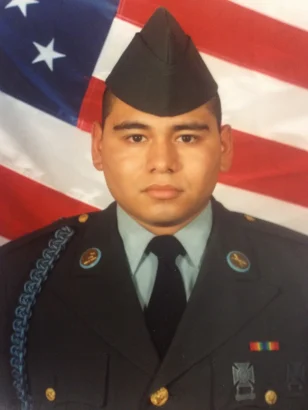
Jose Leal admits to experiencing PTSD during and after his tour in Iraq. Courtesy of Sergeant ‘Jose “Joe” Leal
Combat soldier, 47, founder of Vet Hunters Project, Upland California
Tour of Duty in Operation Iraqi Freedom
February 2003—September 2004
Jose Leal took part in the invasion of Iraq in March 2003. He remembers going “town by town, north to Baghdad” engaged in firefights.
“When you’re firing, you don’t know all the time who got hit; none of us was proud of killing,” he said. “But my job was to make sure I didn’t go home in a body bag and my buddies didn’t either.”
Still, Leal lost close friends on the battlefield, such as Sergeant Kelly Bolor, who was killed in November 2003.
“When you lose someone, you gotta bury that somewhere inside and get back out there. It comes out later as PTSD.”
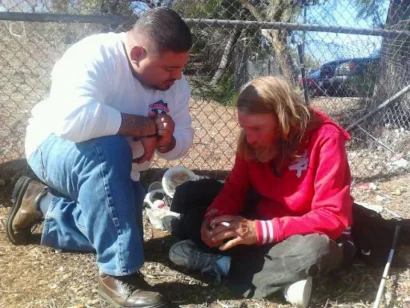
Today, Leal helps homeless veterans find shelter and support. Joe Leal
Stateside, he tattooed his chest with an eagle in memory of Bolor.
Rejecting medication (“I’d rather treat PTSD by being of service”), he established the non-profit Vet Hunters Project to help homeless veterans back home.
Besides his full-time job as a veterans’ counselor, Leal goes into the hills and under the freeways of California to assist veterans in need of support.
Tents, showers, meals, shelter — Leal’s team has provided them to hundreds.
US Army Captain Timothy Hornik
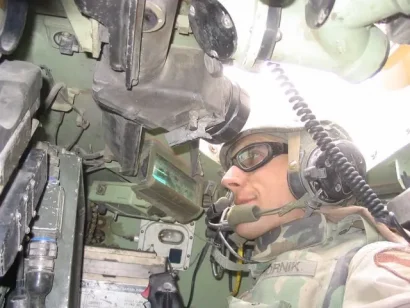
Hornik during his time in Iraq, where he lost his sight after being shot in the head by a sniper. US Army Captain Timothy Hornik
Patrol leader, 43, Chief of Staff of Blinded Veterans Association, Lawrence, Kansas
Tour of duty in Operation Iraqi Freedom:
September – November 2004
Army service: 2002-2011
On Veterans Day 2004, while providing roadside security along in the infamously dangerous Route Irish between Baghdad and the heavily fortified Green Zone, Tim Hornik was shot in the head by a sniper. (“It felt like getting punched in the head”).
Hornik’s buddies performed first aid and his life was saved.
Hornik awakened to learn he had lost his sight, which “was not the crushing blow you’d expect,” he recalls.
At least not initially: “Denial is a wonderful thing.”
Once he realized his blindness “was permanent,” Hornik concedes he “went through the stages of loss.”
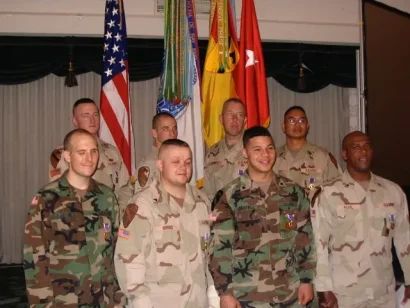
Hornik received a Purple Heart for his service. US Army Captain Timothy Hornik
After entering a VA program for blind vets, Hornik served seven years of additional active duty, and earned a masters’ in social work.
He and his wife Cate have two daughters, which makes for its own kind of fun, “I usually have nail polish on me,” he says.
Today, Hornick leads an organization that aids blind veterans navigate the US Department of Veterans Affairs
As Honrick can personally attest, “blind veterans need a lot of assistance.”
Lieutenant Colonel Kim Enderle
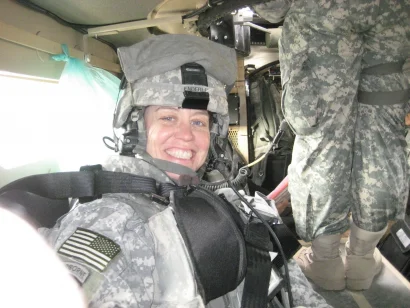
Kim Enderle helped prevent corruption during her time in Iraq. Lieutenant Colonel Kimberly Enderle
Army helicopter maintenance test pilot and logistician; 57, PhD candidate in 20th Century US history, University of Massachusetts, Amherst
Tour of Duty in Operation Iraqi Freedom:
July 2008—July 2009
Enderle had a unique role in Iraq, helping to prevent corruption in efforts to account for the $5.4 billion in US supplies provided to Iraq.
Few Iraqis had ever engaged with a high-ranking, blue-eyed female officer — leading to awkwardness for Enderle, who trained Iraqis to prevent the loss of military supplies including vehicles and weapons the U.S. provided Iraq’s Army.
“It was interesting for them to interact with a woman officer. I didn’t feel sexism but there was a distance.”
After working 18-hour days, 7 days a week, her boss sent her to an Army resort with pools, ornate floors, and marble staircases.
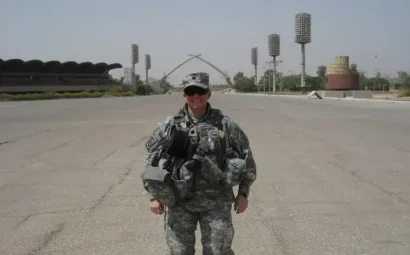
“It was interesting for them to interact with a woman officer. I didn’t feel sexism but there was a distance,” say Enderle of her Iraqi colleagues. Lieutenant Colonel Kimberly Enderle
The first night she startled awake to rockets landing in the compound – which had been one of Saddam’s palaces.
“I asked to go back … and get my body armor and weapon.”
“It’s not about race, ethnicity, gender or sexual orientation. The important thing is your ability to get the job done.”
Lieutenant Colonel Scott Mann
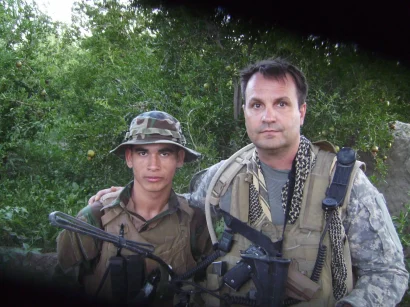
During his time in Afghanistan, Scott Mann befriended many Afghani soldiers including Abdul Rahmann Jabaar, who was rumored to have injured Taliban-founder Mullah Omar. Courtesy of Scott Mann
Ret. US Army Green Beret; Village Stability Advisor; founder of Task Force Pineapple; playwright of “Last Out: Elegy of a Green Beret;” 55, Tampa Fla.
Tours of duty in Afghanistan’s Operation Enduring Freedom:
Sept. 2004 – June 2005/Jan. – July 2006/Jan. – Nov. 2010/5 more 30-45 day deployments
His name was Abdul Rahmann Jabaar, but the Afghan villagers called him “Hero.”
At 6 feet, he weighed nearly 400lbs, with a handlebar mustache and “arms as big as my thighs,” recalls US Army Green Beret Scott Mann.
Rumored to be “the fighter who shot out [Taliban-founder] Mullah Omar’s eye,” Mann found Jabaar hiding from the Taliban in a Kabul safehouse back in 2010 and persuaded him to return to Maiwand, his hometown, to help his community fight the Taliban.
Mann was proud when Jabaar, representing non-extremist Afghans, was elected to Parliament in 2012 – and aghast when a suicide bomber killed him six years later.
“I encouraged him to go into public life and help his people. He was ultimately killed for it, so that haunts me.”
During the US pullout, Mann founded Task Force Pineapple, staffed by US veterans who worked to evacuate highly-vetted Afghan allies from the country.
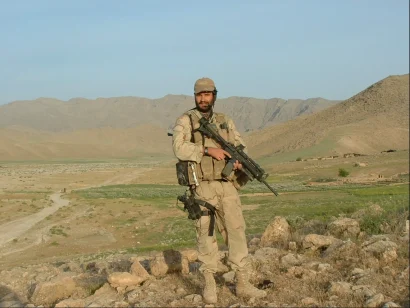
Mann laments how US officials left behind in Kabul many, many locals who aided the US war effort in Afghanistan. Courtesy of Scott Mann
Afghan sources tell him some of the weapons the US left behind have been used against the innocent by the Taliban, Hezbollah — and even Hamas.
“We left allies and weapons in the place that’s the origin of the worst terror attack in history.”
He views Islamist extremism as America’s top threat.
“Hamas, Al Qaeda, ISIS, even the Taliban are bent on a global narrative to restore a Caliphate. To view it as a local or even regional problem is putting ourselves at risk.”
This entry was written by Heather Robinson and posted on November 22, 2023 at 10:52 am and filed under Features. permalink. Follow any comments here with the RSS feed for this post. Keywords: . Post a comment or leave a trackback: Trackback URL. */?>



